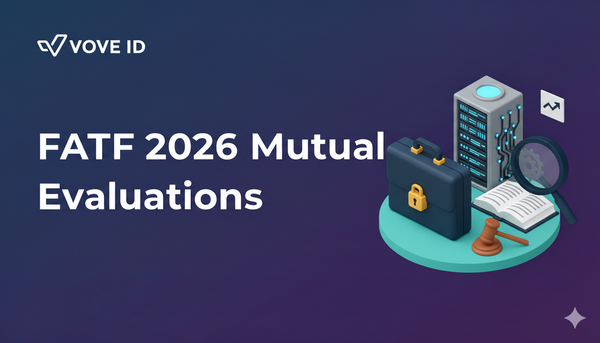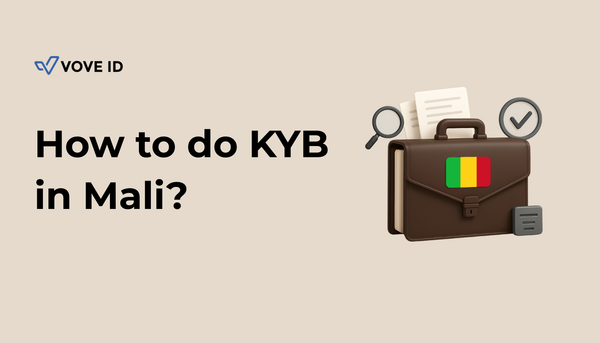AML Compliance in Nigeria: A 2025 Guide for Fintechs and Regulated Businesses
Master AML compliance in Nigeria for 2025. Discover key laws, CBN regulations, automation trends, and how fintechs can integrate AML into KYC/KYB workflows with tools like VOVE ID.

Why AML Compliance Matters in Nigeria
Anti-money laundering (AML) compliance is critical for safeguarding Nigeria’s financial system, especially in its fast-growing fintech hub. As West Africa’s largest economy, Nigeria faces risks from fraudulent flows, terrorism financing, and cash-heavy transactions. In 2025, AML and counter-terrorist financing (CFT) compliance is non-negotiable for fintechs, neobanks, and regulated businesses to build trust, meet Central Bank of Nigeria (CBN) standards, and align with global regulators like FATF and GIABA.
Nigeria’s ongoing FATF Grey List status underscores the urgency of robust AML systems. Over 60% of Suspicious Transaction Reports (STRs) in 2023 came from tech-driven platforms like mobile money apps, highlighting the need for scalable solutions like VOVE ID to streamline compliance.
Legal and Regulatory Framework for AML in Nigeria
Nigeria’s AML/CFT framework is among Africa’s most robust, driven by key laws and oversight bodies:
- Money Laundering (Prevention & Prohibition) Act 2022 (MLPA): Criminalizes money laundering, mandates Customer Due Diligence (CDD), STR filing, and five-year record retention.
- Terrorism (Prevention & Prohibition) Act 2022: Addresses terrorist financing, asset freezes, and sanctions compliance.
- Proceeds of Crime (Recovery and Management) Act 2022: Regulates recovery of illicit funds and enhances enforcement.
- NFIU Act 2018: Establishes the Nigerian Financial Intelligence Unit (NFIU) as the central authority for STR analysis and intelligence sharing.
- CBN AML/CFT/CPF Regulations 2022 & 2025 Draft Standards: Includes Beneficial Ownership Guidance (2023) for corporate due diligence and mandates automation (released May 20, 2025).
Key Regulatory Authorities
- NFIU: Collects and analyzes STRs, sharing intelligence with enforcement agencies.
- Central Bank of Nigeria (CBN): Issues AML regulations, conducts inspections, and enforces automation mandates.
- Economic and Financial Crimes Commission (EFCC): Investigates and prosecutes money laundering and terrorism financing.
- Special Control Unit against Money Laundering (SCUML): Oversees Designated Non-Financial Businesses and Professions (DNFBPs) like real estate and NGOs.
- SEC, NAICOM: Supervise AML compliance in capital markets and insurance.
Who Must Comply with AML Rules?
AML compliance applies to:
- Fintechs (mobile money, digital wallets, BNPL platforms)
- Neobanks and digital lenders
- Cryptocurrency exchanges and OTC desks
- Remittance and forex operators
- DNFBPs (real estate agents, lawyers, accountants, dealers in precious metals)
These businesses must integrate AML into their Know Your Customer (KYC) and Know Your Business (KYB) workflows, leveraging tools like VOVE ID for seamless onboarding and monitoring.
Core AML Requirements for Nigerian Businesses
To meet CBN and NFIU standards, businesses must embed AML into their operations:
- Customer Due Diligence (CDD) & Enhanced Due Diligence (EDD)
- Verify identities using Nigerian passport, NIN, BVN, driver’s license, or voter ID.
- Conduct EDD for Politically Exposed Persons (PEPs), high-risk clients, or those from high-risk countries.
- Ensure beneficial ownership transparency per the CAMA-mandated PSC register, updating records annually.
💡 VOVE ID Solution: Supports NIN, BVN, and biometric verification (e.g., selfie checks, liveness detection) for secure CDD/EDD.
- Transaction Monitoring & Suspicious Transaction Reporting (STR)
- Monitor for unusual patterns (e.g., large cash inflows, crypto transfers, cross-border payments).
- File STRs or Currency Transaction Reports (CTRs) to NFIU within 24 hours for suspicious activities like fraud, terror financing, or unregistered crypto transactions.
💡 VOVE ID Solution: Automates transaction monitoring and STR logging, simplifying audit preparation.
- Sanctions Screening
- Screen customers against UN, EU, UK, OFAC, and local NFIU/EFCC watchlists.
- Automated screening is mandatory under CBN’s 2025 standards.
💡 VOVE ID Solution: Integrates real-time watchlist screening APIs for compliance.
- Record Keeping
- Retain CDD data, transaction logs, and reporting records for at least five years (some sources suggest 10 years).
- Staff Training & Compliance Governance
- Train staff on Nigeria-specific typologies, STR protocols, and sanctions updates.
- Appoint compliance officers and maintain audit-ready escalation processes.
2025 AML Trends: Automation Takes Center Stage
The CBN’s 2025 draft standards for Automated AML Solutions (May 20, 2025) signal a shift to real-time, AI-driven compliance. Key expectations include:
- Real-Time Alerts: Flag high-risk transactions (e.g., crypto flows, structured cash deposits).
- Dynamic Rule Engines: Use AI for anomaly detection and risk scoring.
- Onboarding Integration: Link AML with NIN/BVN-based KYC/KYB workflows.
- Stress Testing: Calibrate systems to reduce false positives.
- Audit Trails: Embed regulatory reporting for CBN/NFIU compliance.
Platforms like VOVE ID align with these standards, offering API-first solutions for transaction monitoring, watchlist screening, and automated STR filing.
2025 AML Trend | Impact on Businesses |
|---|---|
FATF Grey List Pressure | Faster rule updates, stricter enforcement |
Digital ID Adoption | NIN/BVN as onboarding baselines |
AML Automation | AI tools replace manual reviews |
Fintech Audits | Increased CBN/SCUML oversight of VASPs |
Cross-Border Scrutiny | Heightened due diligence for remittances/crypto |
Nigeria’s AML Challenges and Solutions
Nigeria’s unique landscape poses challenges, but tools like VOVE ID can help:
- Low Formal ID Coverage: VOVE ID’s layered verification (NIN, BVN, biometrics) ensures compliance despite gaps.
- Manual STR Processes: Automated flagging and reporting reduce compliance lag.
- Fragmented Oversight: VOVE ID’s centralized platform adapts to CBN, NFIU, and SCUML requirements.
- Regulatory Ambiguity: Prebuilt templates align with Nigeria’s AML/CFT laws.
International Context: FATF and GIABA
Nigeria remains on FATF’s Grey List in 2025, requiring stronger enforcement, especially for DNFBPs, beneficial ownership transparency, and prosecution outcomes. As a GIABA member, Nigeria aligns with West African AML/CFT goals, making compliance critical for regional expansion.
Why Fintechs Should Prioritize AML Compliance
Integrating AML into KYC/KYB workflows offers:
- Regulatory Readiness: Meet CBN, NFIU, and EFCC inspection standards.
- Risk Mitigation: Reduce fraud, sanctions violations, and reputational damage.
- Competitive Edge: FATF-compliant fintechs gain trust for regional growth.
- Cost Efficiency: Automation via VOVE ID cuts labor and speeds onboarding.
Practical Steps to Embed AML in Your Workflows
- Layer AML Rules: Integrate risk scoring, watchlist screening, and alerts into KYC/KYB profiles.
- Adopt CBN-Compliant Tech: Use VOVE ID’s rule-based engines and real-time transaction scoring.
- Streamline Case Management: Escalate high-risk alerts, annotate STRs, and maintain audit logs.
- Train Teams: Focus on Nigeria-specific typologies and local sanction lists.
- Test Annually: Simulate high-risk scenarios to refine rules and reduce false positives.
Final Thoughts
In 2025, Nigeria’s AML/CFT landscape demands more than basic compliance—it requires scalable, automated systems to navigate CBN regulations, FATF scrutiny, and local risks. By integrating AML into KYC/KYB workflows with platforms like VOVE ID, fintechs can reduce risk, ensure compliance, and position for growth across Nigeria and the MENA/Africa region.
Ready to streamline AML compliance? Tools like VOVE ID make it faster and smarter, aligning with Nigeria’s 2025 standards.




